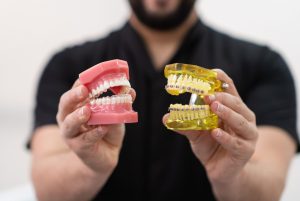Your smile is one of the very first things that people notice about you. And who doesn’t want to be the person with a beautiful smile, right? That’s why dental veneers have become a popular cosmetic dental treatment over the years. Dental veneers offer a quick and effective solution for improving the appearance of teeth, whether you have discolouration, gaps, or misaligned teeth. However, while dental veneers are a long-lasting solution, they still require proper care and maintenance to keep them looking and functioning at their best.
In this blog, we’ll explore how long dental veneers last and how to care for them to ensure that they remain in good condition for many years.
How long do dental veneers last?
The lifespan of dental veneers can vary depending on several factors. These factors include the following:
- The quality of the materials used to make the veneers
- The skill and experience of your dentist who placed the veneers
- Your oral hygiene habits
- The extent of wear and tear on the veneers, such as teeth grinding or clenching
On average, dental veneers can last between 10 and 15 years with proper care and maintenance. However, some veneers may last even longer. It is important to note that the lifespan of veneers can be affected by a variety of factors, as mentioned above.
There are a few signs that can indicate that dental veneers may need to be replaced. These signs include:
- Discolouration or staining of the veneers, chips or cracks in the veneers
- The appearance of gaps or spaces between the veneers and the teeth
- Loose or ill-fitting veneers
- Pain or discomfort in the teeth or gums near the veneers
If you notice any of these signs, seek the advice of your veneers dentist to get treated.
By understanding the factors that affect the lifespan of dental veneers and knowing when to look out for signs of wear and tear, you can take steps to care for your veneers and ensure that they last as long as possible.

How do I take care of my dental veneers?
Daily oral hygiene routine
Brushing teeth twice a day and flossing daily is important for maintaining oral hygiene and keeping dental veneers in good condition. When brushing, use a soft-bristled toothbrush and a non-abrasive toothpaste to avoid damaging the veneers. When flossing, observe a gentle sawing motion to avoid pulling on the veneers.
Mouthwash can help freshen breath and kill bacteria that can cause tooth decay or gum disease. However, you should avoid using mouthwash that contains alcohol, as it can cause damage to dental veneers over time.
Foods that can stain or damage veneers
Additionally, you should avoid biting into hard or crunchy foods that can cause damage to the veneers, such as ice or hard candy.
Habits that can damage veneers, such as biting nails or using teeth as tools
It is important to avoid using their teeth as tools to open packages or bottles, and they should refrain from biting their nails, as these habits can cause damage to dental veneers.
The importance of regular dental checkups
Regular dental checkups are important for maintaining dental veneers and ensuring that they remain in good condition. During these checkups, your dentist can examine the veneers for any signs of wear and tear and recommend any necessary repairs or replacements.
If you have dental veneers, you need to schedule dental checkups at least twice a year, or as recommended by your dentist.

Other considerations when getting Veneers in Bayswater and Boronia
Dental veneers Vs other cosmetic dental treatments
While dental veneers are a popular cosmetic dental treatment, there are other options available, such as teeth whitening, dental bonding, or orthodontic treatment. You should consult with your dentist to determine which treatment is best for your individual needs.
Cost of dental veneers and replacement
The cost of dental veneers is affected by several factors, including the type of veneers, materials used, the complexity of the case, and the location of the dental practice. Porcelain veneers are more expensive than composite resin veneers and higher quality materials can also increase the cost. The complexity of the case and the expertise required can also affect the price and the location of the dental practice. For more information about the cost of dental veneers, contact our team today.
Alternatives to dental veneers
Dental veneers may not be the best option for patients with poor oral health, teeth grinding, or insufficient tooth enamel. Veneers can also be costly, and others may prefer alternative treatments like teeth whitening or dental implants. Additionally, the placement of veneers is irreversible and may require some removal of natural tooth structure. Your veneers dentist can evaluate your specific needs and goals to determine whether veneers are a suitable treatment option.
Overall, proper care and maintenance are essential for prolonging the lifespan of your dental veneers. By taking the necessary steps to care for dental veneers, you can help ensure that they continue to look and function properly for many years.
If you’re considering getting dental veneers, we’d love to welcome you to our clinics in Bayswater and Boronia. Call us on 1800 180 581 or book online. We can’t wait to see you!


